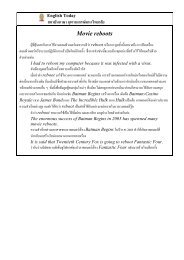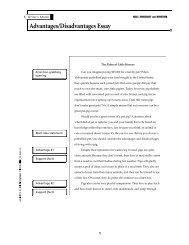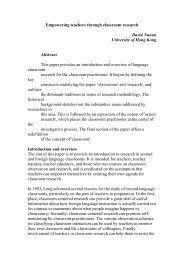Using Interviews as Research Instruments - CULI
Using Interviews as Research Instruments - CULI
Using Interviews as Research Instruments - CULI
Create successful ePaper yourself
Turn your PDF publications into a flip-book with our unique Google optimized e-Paper software.
• Identify appropriate topics and questions;<br />
• Decide on the level of detail;<br />
• Draft the questions;<br />
• Order the questions;<br />
• List any probes or prompts; and<br />
• Pilot the questions. Have the informant identify the problems<br />
during the pilot.<br />
Types of <strong>Interviews</strong><br />
There are many types of interviews, which include:<br />
• structured interviews,<br />
• semi-structured interviews,<br />
• unstructured interviews,<br />
• non-directive interview.<br />
This article discusses the aforementioned interviews and ethical issues<br />
involved in conducting interviews.<br />
Structured <strong>Interviews</strong><br />
A structured interview is sometimes called a standardized interview. The<br />
same questions are <strong>as</strong>ked of all respondents. Corbetta (2003, p.269) states<br />
structured interviews are<br />
“ … interviews in which all respondents are <strong>as</strong>ked the same questions with<br />
the same wording and in the same sequence.” It would be ideal if<br />
questions can be read out in the same tone of voice so that the<br />
respondents would not be influenced by the tone of the interviewer (Gray,<br />
2004, p. 215).<br />
Bryman (2001 p. 107) explains structured interview entails:<br />
… the administration of an interview schedule by an interviewer.<br />
The aim is for all interviewees to be given exactly the same<br />
context of questioning. This means that each respondent receives<br />
exactly the same interview stimulus <strong>as</strong> any other. The goal of this<br />
style of interview is to ensure that interviewees’ replies can be<br />
aggregated … Questions are usually very specific and very often<br />
the interviewee a fixed range of answers (this type of question is<br />
often called closed, closed ended, pre-coded, or fixed choice).<br />
This type of interview introduces some rigidity to the interview (Corbetta,<br />
2003). For example, probing can be a problem area for structured<br />
interviews. Respondents may not understand the question and unable to<br />
answer it. Moreover, respondents may not have received sufficient<br />
information to answer the question. Bryman (2001, p. 118) clarifies,





